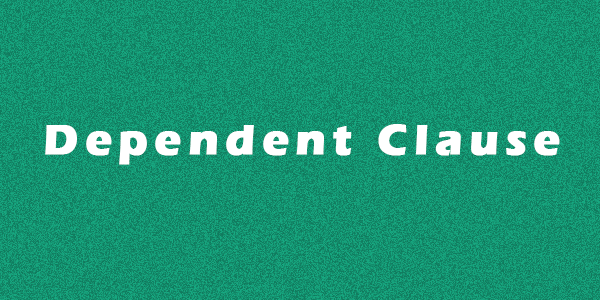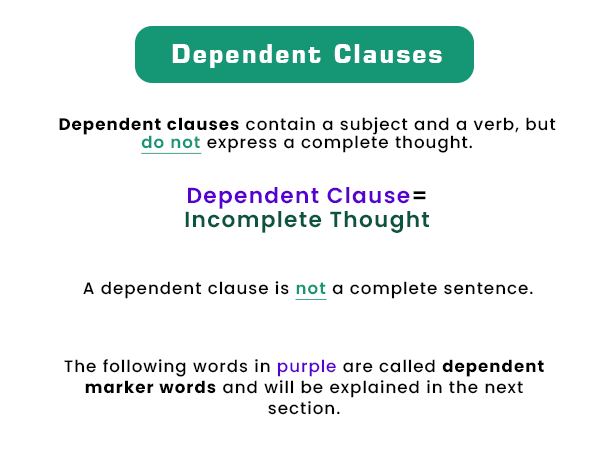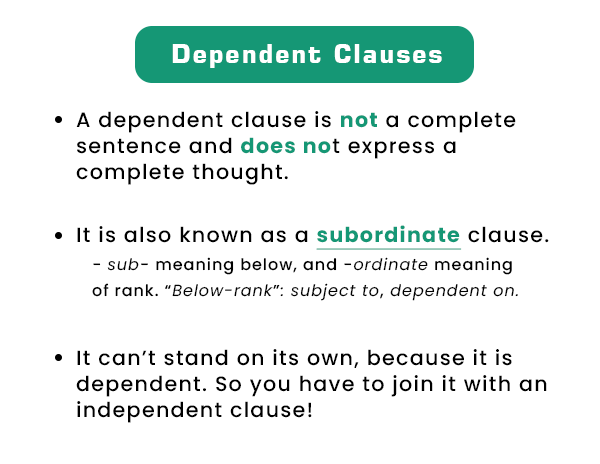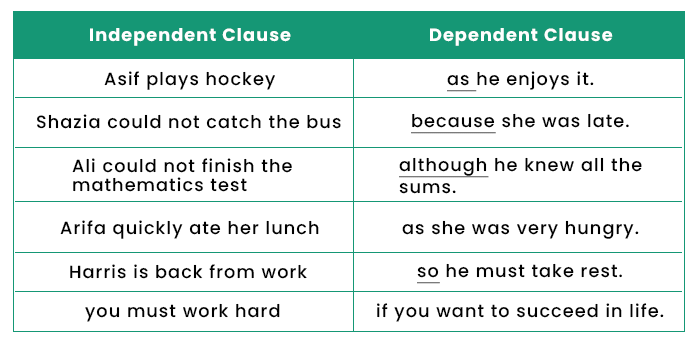Dependent ClauseIndependent and dependent clauses are the two categories into which sentences can be classified. Independent clauses are capable of existing without reference to any other clause and convey a complete thought. In contrast hand, dependent clauses are dependent on another clause to exist. 
If we end up leaving dependent clauses dangling in our writing, not only will our reader be perplexed, but we will also be creating unfinished sentences. Think about dependent clauses as being similar to cordless headphones. Unless you link them to a power supply that can transmit the music into your earphones, they serve no purpose at all. Even if you can listen to music on your computer or smartphone, the headphones are still worthless without a Bluetooth connection. Similar to independent clauses, dependent clauses are essentially worthless without them. But when the two are connected, the dependent sentence makes sense, and the independent clause has additional significance. Both recognizing dependent clauses and linking them to independent clauses can be done in a variety of ways. What is a Dependent Clause?A clause that can never stand by itself as a proper sentence because it does not represent a complete notion is known as a dependent clause (or subordinate clause). A dependent clause comprises a subject and verb, just like any other clause. Also, A dependent clause needs an independent clause to make logical sense because it does not convey a complete concept. For instance: Which is one of our beloved memories. Does the above sentence seem to be a coherent thought? Obviously not! You undoubtedly feel frustrated after reading anything like this because the author simply provided you with a sentence fragment. The statement makes considerably more sense when the dependent clause from above is joined with an independent clause: We giggled together as we remembered swimming in the river behind our cottage, which is one of our beloved memories . 
What Relationship Exists Between Dependent and Independent Clauses?In a sentence, dependent clauses may come either prior to or after an independent clause. They must be coupled with punctuation in particular ways based on where they are in the sentence. A comma must separate the dependent clause from the independent clause if it appears in the sentence well before the independent clause. The purpose of doing this is to direct readers to the sentence's major action. Readers understand that the first portion of the sentence was only a preface to the main idea when they notice the comma following the dependent clause. For instance: Whenever I go on a stroll, I like to say "greetings" to every person that I meet. The dependent phrase in the preceding sentence only informs the reader when the subject greets her companions. The statement would still make sense without it, but it is useful to be aware of these additional details. A comma is not required to join the two clauses jointly if the dependent clause follows the independent clause in the sentences. This is because everything that follows the main subject and verb is probably just extra information because the reader already knows the sentence's main activity. For example; My mother would not allow me to keep a snake on our farm even though I really wished for one. 
What Are The Three Types Of Dependent Clauses?Dependent clauses can be of three types: Adverb clauses, Adjective clauses, and Noun clauses. Let us have a look at these in detail 1. Dependent Adverbial ClausesAdverbial dependent clauses function similarly to adverbs in that they add details about the independent clause's primary verb as a clause. These clauses cannot stand alone in your writings, just as you wouldn't assume that an adverb on its own could complete a phrase. Subordinating conjunctions like after, even though, because, if, as soon as, etc. are the first words in adverbial dependent clauses. Check to check if the dependent clause responds to one of the following queries to see whether it is serving as an adverb: where, why, how, when, or to what extent was the activity done. For instance: After our mountainous excursion, I understood just how intelligent Wolves can be. This adverbial clause answers the question of when did the subject come to realize the intelligence of Wolves ? 2. Relative Dependent ClausesAdjective-like relative dependent clauses provide further information about a noun that is part of the independent clause. This noun must appear in the independent clause, whether it is the subject or the object. Relative pronouns like that, which, who, whom, or whose are used to begin relative dependent sentences. Ask the phrase if it responds to one of these 2 questions: which one or what kind? If you are unsure whether it is working as an adverb or an adjective. For instance: The amazing bookshop that is situated in the city center has the biggest cat ever. 3.Noun Clauses/Clauses Dependent on NounsAdverb or relative dependent clauses vary slightly from noun dependent clauses. We must be cautious when detecting noun clauses since they can act as absolutely any noun in the sentence. It is not dependent if the noun clause serves as the sentence's subject. However, it is a dependent clause if the noun clause replaces an object. Who, what, when, where, how, and why are examples of interrogative pronouns that can be used at the beginning of a noun phrase, or they can even start with expletives like that, whether, and if. For instance : The artist questioned who colored the roses red" The highlighted noun clause in the previous sentence serves as the direct object of the verb 'colored'. Here is an illustration of a noun clause that is independent : What she had accomplished was irreparable. The full sentence is one independent clause since the noun clause, what she had accomplished, serves as the sentence's subject. Three Great Tips for Understanding Dependent ClausesHere are some crucial pointers to assist you in understanding dependent clauses: Tip #1: For a dependent clause to make sense, it must be connected to an independent clause . For instance ; I will never know how the fantastic movie, 'Mowgli', got a poor review from the critics. A noun clause serves as the direct object of the dependent clause highlighted above, despite being a large phrase, the four words that comprise the independent clause before it remains crucial. Tip #2: Dependent clauses function in sentences as adverbs, adjectives, or nouns. For instance : Relative clause (offers the answer to which one): Do you know the pastry woman who resides in Lancashire ? Adverbial phrase (answers the question, 'when') After Jacky rolled down the steep hill; he broke his legs. Noun clause: (takes the position of the direct object): Do you understand how a blackbird is like a school desk ? Tip #3: Although dependent clauses are useful for extending a sentence's details, they are not necessary to develop a complete thought. For instance : Although we were in Orlando for over a week, we never met an actor. The underlined clause is not necessary for the independent clause, "We never met an actor," to be grammatically correct, but it does provide some useful context regarding the time and location at which the subject did not spot the actor. Examples of Dependent Clauses With Explanations1. The brown dog, who always had a red neckpiece, led Elizabeth down the slope. Who always had a red neckpiece is the dependent clause in this sentence. Because it changes the Brown Dog, the sentence's subject, this clause functions as an adjective. 2. After the Dog destroyed his field, the owner planned revenge against him. After the Dog destroyed his field is the dependent clause in this phrase. The fact that this clause modifies the verb planned and informs the reader of when and why the owner "planned revenge" on the Dog makes it function like an adverb. 3. Alia was chosen to confront the winner even though he had never battled before . Even though he had never battled before is a dependent clause in this phrase since it starts with a subordinating conjunction and isn't followed by a semicolon or comma like the independent clause is. 4. Alice was unsure about how she got to Paradise . The dependent clause that replaces the direct noun object in this clause is how she got to Paradise. 5. As Kitty smiled, her fur began to fall, and soon the only thing left visible was the sparking smile. The clause as Kitty smiled is dependent. Because it functions as an adverb in this sentence and indicates when the Kitty vanished. Pro tip: Keep in mind that dependent clauses replace adverbs, adjectives, and nouns in sentences and cannot communicate a complete notion on their own. 
Why Dependent Clauses Are CrucialHere are two typical problems with dependent clauses. (Issue 1) Employing a comma with a dependent clause. Writers frequently disagree on whether to use commas to separate dependent clauses. Following are the guidelines that apply : (Rule 1) Split your dependent clause with a comma if it contains a fronted adverb. An adverb will be used in place of a dependent phrase that begins with a subordinating conjunction, such as "when," "unless," "because," or "until." Use a comma to separate the clause from the rest of the sentence when it appears at the beginning. Do not use a comma to separate it if it concludes the sentence. The subordinating conjunctions are bolded, and the dependent clauses are highlighted in these cases. When the batter reaches uniformity, stop beating and add the peppermint extract. (A comma is required since the dependent clause begins the sentence. ) Stop beating and add the peppermint extract when the batter reaches uniformity. (Since the dependent clause comes last, there is no need for a comma. ) Note that this ruling also covers adverbial phrases. Adverbial phrases in bold are examples. At the end of the shift, the train car will come back to the station. The train car will come back to the station at the end of the shift. (Rule 2) Use a comma (or two commas if it occurs in the middle of the phrase) to separate your dependent clause from any non-essential adjectives. The dependent phrase will act as an adjective if it begins with a relative pronoun, such as "which," "who," or "that." If the clause is necessary for understanding, do not use a comma preceding your relative pronoun (called a restrictive clause). However, if the clause is simply supplementary information, use a comma (called a non-restrictive clause). For instance : My sister, who lives in Canada, was bitten by a dog. (From this, it may be concluded that at least one additional sister doesn't reside in Canada. The clause's meaning depends on it. It defines which sister it alters, identifying what it modifies. A restrictive clause like this one is an example. ) My sister Sandra, who lives in Canada, was bitten by a dog. (So this is the clause that is just adding extra details. Commas are required. An illustration of a non-restrictive clause is this. ) Top Tip It requires commas if you'd gladly put parentheses () around your clause. (Commas are really a form of parenthetical punctuation, after all. ) (Issue 2) Avoid using "which" at the beginning of declarative sentences. Who or which cannot begin a declarative sentence (i.e., a statement)? For instance: I hate cutting the grass, which isn't great because I have a massive lawn. Of course, you can begin a phrase with "who" or "which" if it's a question (i.e., to begin an interrogative sentence). Dependent clauses don't make much sense when they stand alone. For instance:
However, their significance becomes evident when they are incorporated into separate clauses:
Let's meet at the eatery that used to be a frame shop. A relative clause that alters the noun restaurant is "that used to be a frame shop. " Typical Mistakes When Combining Dependent ClausesDependent clauses are not whole sentences in themselves. They result in a sentence fragment if they are not connected to another clause. Because it doesn't represent a complete notion, the phrase "because I skipped my assignment" is an example of a sentence fragment. It ceases to be a sentence fragment when combined with an independent clause to form the phrase "Because I skipped my assignment, I was sent home."
Next TopicIndependent Clause
|
 For Videos Join Our Youtube Channel: Join Now
For Videos Join Our Youtube Channel: Join Now
Feedback
- Send your Feedback to [email protected]
Help Others, Please Share










